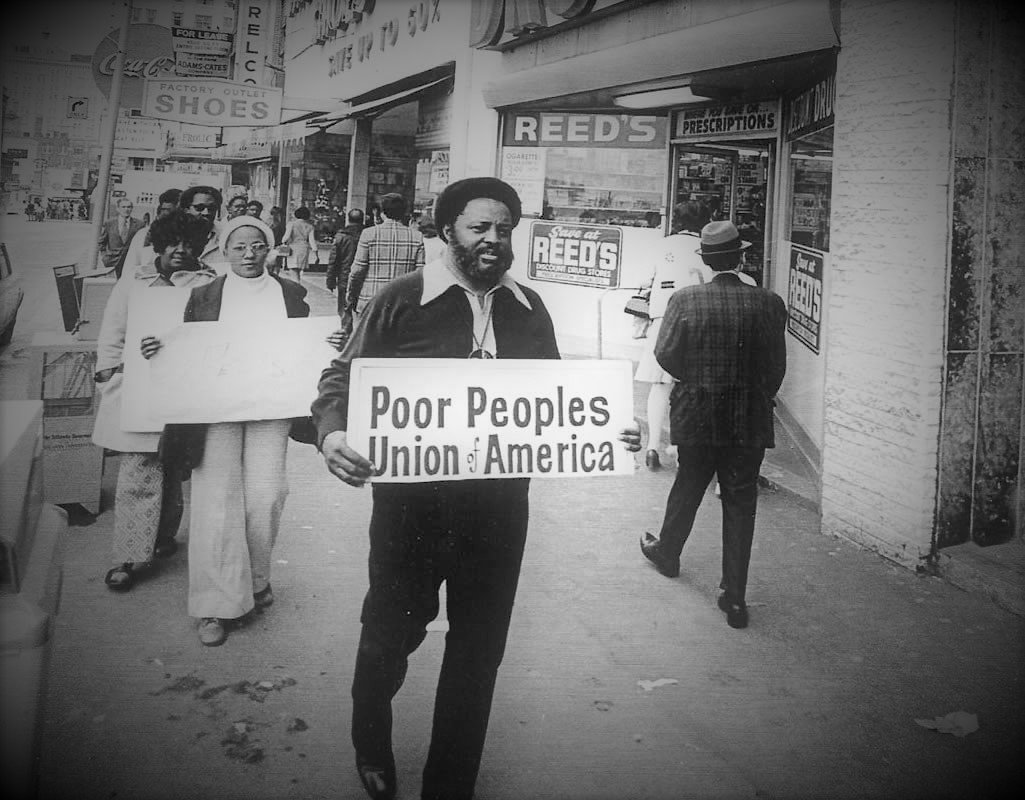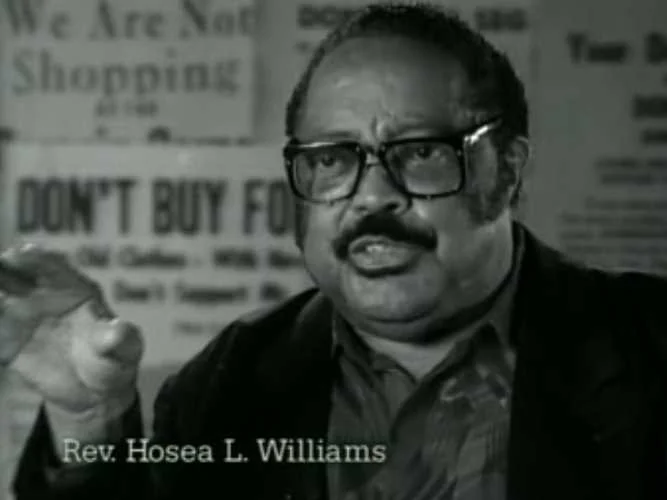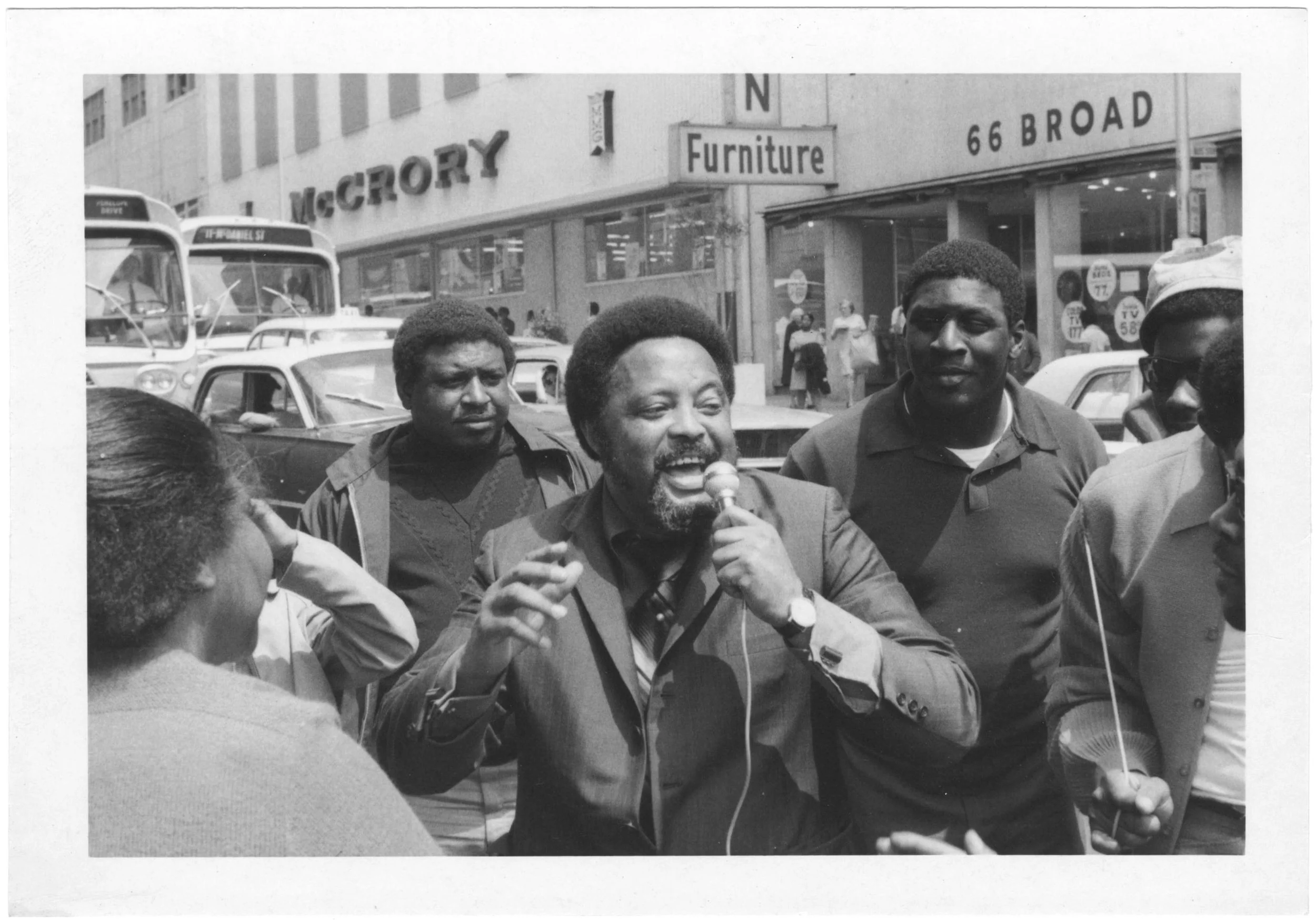From Cornbread to Hosea Williams
Search Terms: “Cornbread”, *Cornbead, “Hosea Feed the Hungry”, “Hosea Williams + Activism”, “Hosea Williams + SCLC”
When I first started the search from my blog post, I had a completely different topic in mind. I was going to use the search term of Cornbread to talk about Black/African American upbringing and soul food. But then I stumbled across an interview from Elisabeth Omilami that talked about her father, Hosea Williams, a civil rights leader that worked with Martin Luther King Jr. Prior to this search, I had not heard of nor knew anything about Hosea Williams. Thus staretd my search through the archive.
Elisabeth Omilami, daughter of Hosea Williams and Activist, describes the founding of Hosea Feed the Hungry and Homeless as well as the persona of her father. She mentions that acts of service was nothing out of the norm for her father. “He’s working for the SCLC (southern christian leadership conference), Metro of Atlanta, Georgia SCLC and he comes down the street and he still has a relationship with the national office. He’s on Auburn Avenue and sees a man in the gutter, you know, asking him for money. So he goes to the fish market and gets him a sandwich and the man eats through the paper.” She also adds, "“My dad has always been a man of action….when he saw a need, he would meet it immediately. So he walked across the street, met with Reverend William Holmes Boarders. They got the educational building and he started feeding 100 men every Sunday and my mom (Juantina Williams) would make soup and cornbread.” This was the first indication of cornbread within a interview in the archive and the contents of the interview caused me to look further into Hosea Williams from his daughters interview.
Elisabeth also discusses her fathers character, during the founding of Hosea Feed the Hungry and Homeless her father was paying for all the food out of pocket, “He was paying for it out of pocket. He’s paying for it. And he never had great income. I mean, he only had his pension from the (U.S) army, some check coming in from the army and something coming from the U.S Department of Agriculture. But he would, he would go and raise money and he was determined from that day on that he was gonna feed the hungry every Sunday and he did until the day he died.”
Tyrone Brooks, a state representative for Georgia talks about the work he did with Hosea feed the Hungry and Homeless in the 70s, " “But also in 1970, Hosea decided that we would start what is called the Feed the Hungry Program, that we'd feed the poor and the hungry on the streets, people off the street, bringing them in, particularly around holidays. It started at the Wheat Street Baptist Church on Auburn Avenue [Atlanta, Georgia].”
After learning about Hosea feed the Hungry and Homeless, I wanted to learn more about Hosea Williams and his activism. Throughout this journey, Elisabeth Omilami was extremely informational about this activism. She discusses the Chatham County Crusade for Voters, “...it was a crusade for voters because he was trying to get black people to register to vote but it was also the organization that did all the night marches and all the civil rights rallies and all the preaching. So even though it was named Chatham County Crusade for Voters, it was his organization that he created when he left the NAACP.”
Tyrone Brooks also adds to the activism Hosea Williams did, “... I also helped Hosea Williams organize the Atlanta chapter because we’d never had an Atlanta chapter until Hosea decided that we just really needed to concentrate on Atlanta (Georgia). Even though Atlanta was Dr. King’s (Martin Luther) home, born and raised here, Atlanta had never really had a major (civil rights) movements. Dr. King had led movements around the world, but he had never led any major movements in Atlanta. And Hosea said ‘You know, this is the hometown of Dr. King. This is where the headquarters is. And we really have neglected it. We really need to do more here’ So he convinced Dr. Abernathy to allow him to set up a local chapter.” Brooks also talks about how passionate Williams was about black workers and their rights being violated, “...That’s when Hosea began to take on all of the major giant corporations in this city that had, had not respected or appreciated the diversity of Atlanta. And we began to break down those walls at Sears Roebuck, C&S Bank, Pepsi Cola, Prestolite Batteries, Coca-Cola, Mead Packaging Company. We took them all on, and we won. And so we saw the employment of African Americans increasing, the promotion of African Americans increasing. We saw more contracts being signed with African American-owned entrepreneurs from these major corporations. We took on Delta Airlines and Eastern Airlines and Prestolite Batteries, a big international, giant battery company. We, we--you know, it was Hosea's leadership.”
These are a few other quotes that Brooks said about Hosea’s passion for employee rights, “employment rights. Because you had all these big department stores and none of these people had any kind of wage laws. They were not under the maids and the janitors and the people that worked for these companies so he was very much trying to organize them.” Brooks mentions that Williams was especially fired up when it came to Afican American workers, “it was discrimination and employment and hiring and wages because the whites were making more per hour than the blacks.”
Civil Rights Activist Ozell Sutton recalls a march Hosea Williams led in Forsyth County, Georgia in which Williams came face to face with the Klan (Ku Klux Klan), He first talks about the issues that were going on in Forsyth, “...All the blacks were driven out of Forsyth County (Georgia) You may not have known that and they were run out of Forsyth County and they were run out without giving them anything for their land, or their houses, they were just driven out.” He then talks about the determination Williams had after hearing about these incidents. “So Hosea [Hosea Williams] took up the task and he announced that he was going to Forsyth County and going to Cummings [sic. Cumming, Georgia], that's the head of Forsyth County and--so he got his group and he went into headed from the main highway up that street or that road that went to Cummings, and the Klan was there to keep him from marching… and they were throwing sticks and bricks and the police were doing nothing to prevent the Klan from attacking the marchers. I persuaded Hosea to let's get out there. Hosea first took the attitude he came to march and he was gonna march.”
Hosea William was the passion behind the civil rights movement. Though it seemed that he had his troubles these quotes by Reverend Dr. Arthur Rocker Sr sum up the legacy of Hosea Williams. “...he start hanging out with Borders, and the next thing I know, he had a center there at Wheat Street [Wheat Street Baptist Church, Atlanta, Georgia], and Borders embraced him. The next thing I know, Hosea began to do different projects the way he was doing projects and doing various things. It was wonderful for Atlanta. Feeding the hungry, started at the Wheat Street church. He just went on and blossomed and Borders was right there with him. And I think what Hosea really needed was Borders because Borders would say that, "Hosea needs me" …”
“Hosea [Hosea Williams] was getting started with Hosea Feed the Hungry [Hosea Feed the Hungry and Homeless], and we attempted to be supportive of that. You know, it was kind of the cradle of where the Civil Rights Movement was, not just in the South, but in the country.”
WORK CITED
Ozell Sutton (The HistoryMakers A2007.020), interviewed by Denise Gines, September 10, 2007, The HistoryMakers Digital Archive. Session 2, tape 7, story 2, Ozell Sutton recalls Hosea Williams' march in Forsyth County, Georgia
Elisabeth Omilami (The HistoryMakers A2006.073), interviewed by Shawn Wilson, April 12, 2006, The HistoryMakers Digital Archive. Session 1, tape 4, story 6, Elisabeth Omilami describes the founding of Hosea Feed the Hungry and Homeless in 1971
Reverend Dr. Arthur Rocker, Sr. (The HistoryMakers A2012.201), interviewed by Larry Crowe, October 26, 2012, The HistoryMakers Digital Archive. Session 1, tape 6, story 8, Reverend Dr. Arthur Rocker, Sr. remembers Hosea Williams
The Honorable Tyrone Brooks (The HistoryMakers A2003.099), interviewed by Larry Crowe, May 6, 2003, The HistoryMakers Digital Archive. Session 1, tape 6, story 2, Tyrone Brooks details his work with Ralph Abernathy and Hosea Williams
Elisabeth Omilami (The HistoryMakers A2006.073), interviewed by Shawn Wilson, April 12, 2006, The HistoryMakers Digital Archive. Session 1, tape 4, story 7, Elisabeth Omilami talks about civil rights issues addressed by her father, Hosea Williams, and his chemical company
William "Sonny" Walker (The HistoryMakers A2011.029), interviewed by Larry Crowe, March 18, 2012, The HistoryMakers Digital Archive. Session 2, tape 8, story 9, William "Sonny" Walker recalls becoming director of the Martin Luther King, Jr. Center for Nonviolent Social Change
Elisabeth Omilami (The HistoryMakers A2006.073), interviewed by Shawn Wilson, April 12, 2006, The HistoryMakers Digital Archive. Session 1, tape 3, story 1, Elisabeth Omilami talks about her father's organization, Chatham County Crusade for Voters




